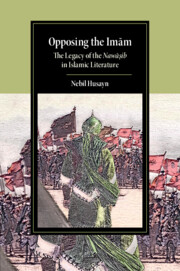‘A valuable contribution to a sensitive topic concerning the development of sectarian identity in Islam. Husayn compellingly examines assumptions about the place of ʿAlī in Islamic thought and carefully analyzes the complex process through which his image was formed, based on representative voices from the Sunnī, Ibāḍī and Muʿtazilī traditions.’
Hussein Abdulsater - University of Notre Dame
‘A welcome addition to the field. Inasmuch as opinions about ʿAlī ‘s role are already diverse, Husayn not only shows that there was a much wider range of opinions about him in the past, but explores - across the variety of genres that comprise the Islamic literary traditions - how those opinions came to be, and also how they came to disappear.’
Aaron Hagler - Troy University
‘An innovative elucidation of a persistent epistemological and theological Sunnī conundrum: the simultaneous appropriation and suppression of pro-‘Alid sentiment. By enriching our understanding of this ambivalence, and in charting how it changed over time, Husayn's work compels us to reconceptualize the nature and development of sectarianism itself.’
Nancy Khalek - Brown University
‘Analyzing Umayyad and Khārijī hostility toward ʿAlī ibn Abī Ṭālib in the early centuries of Islam, Nebil Husayn uncovers a very real, yet suppressed strand in Muslim collective memory. This carefully researched and persuasively argued book is a vital contribution to the study of Islamic history and Sunnī doctrine.’
Tahera Qutbuddin - University of Chicago
‘A major contribution to the historiography of Islamic identity construction. More than just a simple trajectory of anti-Shiʿi sectarianism, it demonstrates the unease that developing Sunni normativity had with praise of ʿAlī and the desire to oppose Shiʿi claims of his saintly authority. Through this creative study of historical texts as rhetorical glimpses of memory, myth and self-fashioning, we can interrogate convenient histories of the erasure and oblivion of negativity in the formation of identity.'
Sajjad Rizvi - University of Exeter
‘Nebil Husayn’s meticulously researched and lucid book provides a rich and detailed description of the multiple ways in which a figure as central as ʿAlī b. Abī Ṭālib was variously imagined and re-imagined in early and classical Muslim thought. It is a model of Islamic intellectual and religious history and ought to benefit specialists as well as non-specialists interested in parallel cases, such as that of Paul of Tarsus.’
Hadi Qazwini
Source: Shii Studies Review
‘In all, this is an excellent book, an important contribution to the field, and a valuable addition for both scholars and students to the bibliography on Muslim sects, the instrumental uses of historiography, and the formation of orthodoxy, especially in (but not limited to) the Sunnī context.’
Edmund Hayes
Source: Journal of Near Eastern Studies
‘This study makes a valuable contribution to the discourse surrounding the construction and formation of Islamic history, offering a hypothesis into the decisions that were taken in formulating Sunni orthodoxy …’
Rebecca Masterton
Source: Journal of Shi‘a Islamic Studies



